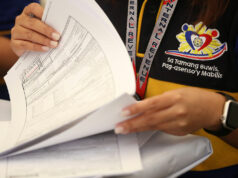Senate eyes pro-poor measures
THE Senate is considering legislation on food subsidies to aid daily wage earners who have temporarily lost their jobs after President Rodrigo R. Duterte stopped work as part of a Luzon-wide lockdown to contain a novel coronavirus outbreak.
The chamber might hold special sessions for that, Senate President Vicente C. Sotto III told reporters on Thursday, as he warned of an “impending public order and financial crisis.”
“I am told the people might run out of food by next week,“ he said. “Public order will suffer. We have to remove legal impediments in the use of available funds swiftly.”
President Rodrigo R. Duterte has declared a state of national calamity after locking down Luzon island to contain the coronavirus disease 2019 (COVID-19) outbreak.
Mr. Duterte extended class suspensions, stopped public transportation and barred most people from going to work.
Mr. Sotto said he had coordinated with Finance Secretary Carlos G. Dominguez III and a high-level economist about the crisis. Special sessions might be held on Friday or Saturday as soon as Mr. Duterte calls for one, he added.
Congress went on an almost two-month Holy Week break on March 13. Hearings in both chambers have also been suspended to prevent the spread of the virus.
Mr. Sotto initially proposed a P27-billion budget to fund a P300 a day worth of assistance per family for a month. Residents of the National Capital Region and central Luzon will be prioritized.
Meanwhile, Senator Maria Lourdes Nancy S. Binay criticized the National Food Authority for the slow distribution of rice to affected residents, while Senator Sherwin T. Gatchalian sought the immediate release of financial assistance to workers.
“The problem with government is red tape and we need to release the funds now,” he said in a statement. He was referring to the P1.3 billion COVID-19 adjustment measures program (CAMP), which gives every worker P5,000.
Also yesterday, Albay Rep. Jose Maria Clemente S. Salceda asked the Inter-Agency Task Force on Emerging Infectious Diseases (IATF) to rationalize checkpoints to prevent road congestion and protect food security.
In a statement, the congressman warned of food shortages if “it takes too many extra hours for food supply to reach demand.”
While food supply remains stable, long cargo queues at multiple municipal checkpoints and provincial border controls “threaten immediate supply stability and increase price pressures.”
Meanwhile, the Commission on Higher Education (CHED) called on universities and colleges to suspend tuition payments during the lockdown period.
CHED Chairman Prospero O. De Vera told a news briefing he had received complaints from parents after some schools required tuition payments during the lockdown that suspended classes and public transportation. — Charmain A. Tadalan, Genshen L. Espedido and Gillian M. Cortez



